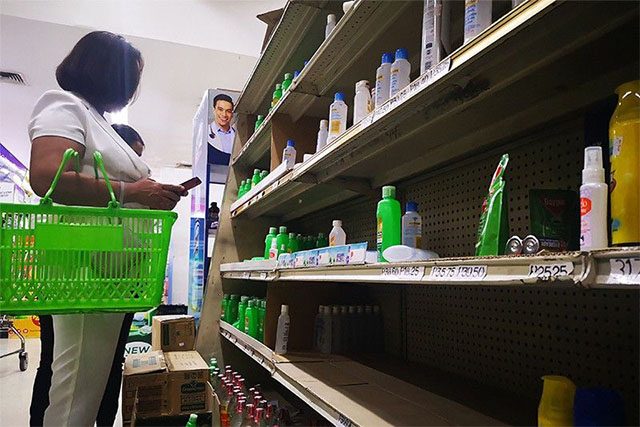
Actress and vlogger Alex Gonzaga apologized for sharing an unverified tweet claiming that there is a “trend” of people getting infected by the novel coronavirus from shopping in grocery stores and supermarkets.
The unverified forwarded message that Gonzaga had tweeted claimed this is a trend in hospitals.
It also advised the public to disinfect the items they bought from grocery stores.
so ayon na nga https://t.co/GsMllcOuc4 pic.twitter.com/oOkBUseLHi
— j• #OustDuterteNow (@joangrans97) April 5, 2020
The 32-year-old actress, however, deleted her post when a Twitter user tagged her in an advisory released by the Philippine General Hospital denying such a trend among their COVID-19 patients.
“Hi yes! Sorry i deleted it na! It was forwarded kasi from a friend na may contact sa doctors. Pasensya na,” Gonzaga responded to the online user.
A similar post attributing the information from “PGH Statistics” was also shared by a Facebook user.
“From PGH statistics. Yung mga new cases nila ng Covid. Ang history of movement. Pumunta lang sa Grocery.”
PGH, one of the designated COVID-19 referral hospitals for the National Capital Region, addressed the online rumors and informed the public that “there is no such observed trend” of acquiring the viral disease from groceries among their COVID-19 patients.
“The two most important risk factors noted are (1) travel history from areas with known local transmission, and (2) close contact with COVID-19 (+) patients,” it said on a statement.
The hospital management nevertheless urged everyone to remain vigilant and constantly practice preventive measures such as strict social distancing, especially in public places.
Marami po ang nag memensahe sa amin patungkol sa kumakalat na issue ng COVID-19. Ito po ang aming opisyal na panawagan sa lahat. Salamat po.
Posted by Philippine General Hospital on Saturday, April 4, 2020
TheFacebook user who posted the false claims then deleted his post and issued an apology upon learning about the PGH’s advisory.
“A few days ago I copied and shared a wrong info regarding Community acquired data on COVID 19 transmission. I have since took it down and please refer to this statement shared by PGH instead. My apologies. But still be EXTRA CAREFUL WHEN IN PUBLIC PLACES,” a screenshot of his post reads.
Despite the PGH’s clarification on the alleged COVID-19 trend being contracted from groceries, Health Undersecretary Maria Rosario Vergeire in a recent radio interview said that some infected patients have only been to grocery stores according to their travel histories.
On Friday, Vergeire admitted that there is a possibility that some COVID-19 positive patients might have contracted the viral disease from grocery stores or through infected items.
“For these past days, marami nagsasabi na naging pasyente natin ay hanggang grocery lang pinuntahan nila, so possible po ‘yan dahil ang virus, kapag lumabas sa inyo, maaaring mag-land sa mga surfaces,” she said.
“Maaaring pumunta doon sa, halimbawa, sa mga delata na binibili natin at ito ay madadala natin sa bahay so ang lagi ho naming sinasabi, gawin niyo ‘yung paghuhugas nang maigi ng kamay,” Vergeire continued.
Grocery stores and supermarkets have been implementing preventive measures in their establishments to curb the spread of COVID-19. Others have been doing it even before the enhanced community quarantine took effect in the whole region of Luzon.
Measures include limiting the number of shoppers entering the establishment, enforcing strict social distancing by placing marks on floors as people wait in line and mandatory temperature scanning, among others.
No to fake news
The Bayanihan to Heal As One Act or Republic Act 11469 prohibits individuals from sharing false information about COVID-19 on social media and other platforms.
They are also prohibited from taking advantage of the global health crisis as a means “to prey on public through scams, phishing, fraudulent emails or similar acts.”
The provision specifically reads that the law punishes the following:
“Individuals or groups creating, perpetrating, or spreading false information regarding the COVID-19 crisis on social media and other platforms, such information having no valid or beneficial effect on the population and are clearly geared to promote chaos, panic, anarchy, fear or confusion.”
“Those participating in cyber incidents that make use or take advantage of the current crisis situation to prey on public through scams, phishing, fraudulent emails or other similar acts.”
Violators can be fined up to P1 million and/or be imprisoned for up to two years.
The provision was added as a last-minute amendment before it was submitted to President Rodrigo Duterte by the Congress.
Critics have noted that it can be used to threaten freedom of expression since such an offense does not legally exist in Philippine laws.









